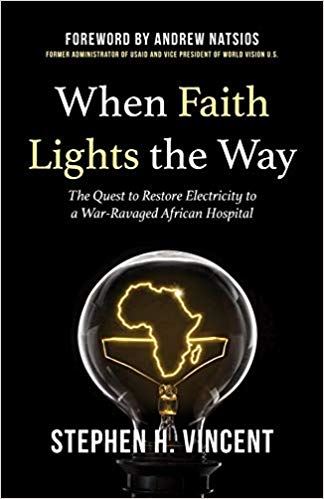How to Keep Your Eye on the Mission: 4 Lessons from a Humanitarian

Growing up in Texas in the 1950s I spent a lot of days in the August heat trying to hit a baseball. My father would pitch, I would swing and miss, and then I heard, “Keep your eye on the ball!” I listened to that encouragement so many times that it still frequently leaps into my mind.
Why is that phrase so essential as a guide in life? Because in life, like when you’re trying to hit a baseball, there are distractions that grab our attention and keep us from our goal.
Over a decade of humanitarian work has taught me that ‘eye-on-the-ball’ focus is also crucial for any mission.
Ten years ago, Power From the SON (PFS), an all-volunteer nonprofit taking on its first project, embraced a humanitarian quest, to electrify an African hospital devastated by a horrific civil war. The civil war was fought along ethnic lines, resulting in the death of over 250,000 people.
After the war, the ravaged hospital was trying to serve 24,000 without electricity. Anesthesia machines wouldn’t function, and physicians were often forced to finish operations with flashlights in their mouths. Keeping our eye on the ball—which in this case was providing adequate power to this life-giving hospital—was crucial for Power From the SON.
How can this and many other ambitious missions succeed? Here are four critical lessons on keeping your focus:
1. Don’t let negative words distract from the work.
So many times, we try to pull the splinter out of someone else’s eye with a hammer rather than removing the log from ours. No two people are the same, and no two believe the same way.
A humanitarian must stay focused on understanding that words and feelings have power. Spewing negative words or responding angrily to negative words only inflames the situation. Working with Liberians taught me they will always bear the scars of a civil war that was escalated by negative feelings and words.
We must keep our eye on the ball of treating others like we want to be treated.
2. Keep the long-term benefits in mind.
What a great accomplishment and personal gratification to go and help those who need help the most! And yet our team kept asking: is what we’re doing of any lasting benefit? How do you give something that will help them improve their standard of living throughout their lives?
Our conclusion was the adage, “Give a man a fish, and you feed him for a day. Teach a man to fish, and you feed him for a lifetime.” Education changes lives. By working to provide electricity, we hoped to also aid education by providing light needed to read books at night and maintaining Internet accessibility.
We kept our eyes on the goal of giving people something they can use to improve themselves throughout their lives and made a difference that way.
3. Tell the truth, not what people want to hear.
I apologize for making a sweeping generality of a group, but most politicians keep their eye on the ball of giving us what we want to hear, not revealing the truth or telling us what we need to hear. Helping others locally or around the globe is only effective if we genuinely evaluate what will help and what will cause harm.
Good feelings and happy emotions are a part of a good solution, but it is hard to truly help someone lead a better life if you don’t investigate the problem, devise a solution, test your answer to see if it will genuinely help them, and then implement the right solutions.
4. Learn to listen and compromise.
In Liberia, Power From the SON didn’t have access to all the equipment we use here in the United States. With all our engineering degrees and heavy construction experience, we didn’t have an idea of how to unload a ten-thousand-pound empty shipping container from a five-foot-high trailer.
It took a group of Bangladesh United Nations peacekeepers a short time to get the container on the ground. They tied the end of the container to a stout tree, started the truck, and drove out from under it!
If you want to help others, you must realize you don’t always know what is best, so you need to compromise and work with others toward a common good.
For each humanitarian, there is a quest within, calling us to action. We are in a boat navigating an uncharted river. For the most part, all of us stay well inside our boat and rely on it to keep us safe and secure. But there are times when that quiet inner voice becomes so compelling that we step out of our boat, causing us to feel less safe, more insecure, and out of our element.
It is counterintuitive, but for me, so many of those times when I left my secure boat were when I also experienced deep feelings of calm, safety, satisfaction, and joy.
In those blessed moments, I felt I understood what I truly needed to keep my eye on – making an impact in my community and the world.

Photo Credit: ©GettyImages/eternalcreative
Originally published September 04, 2019.





